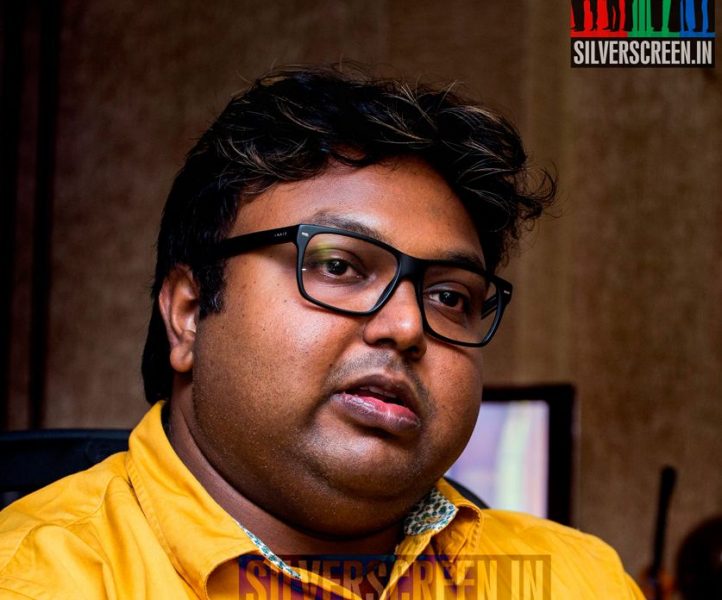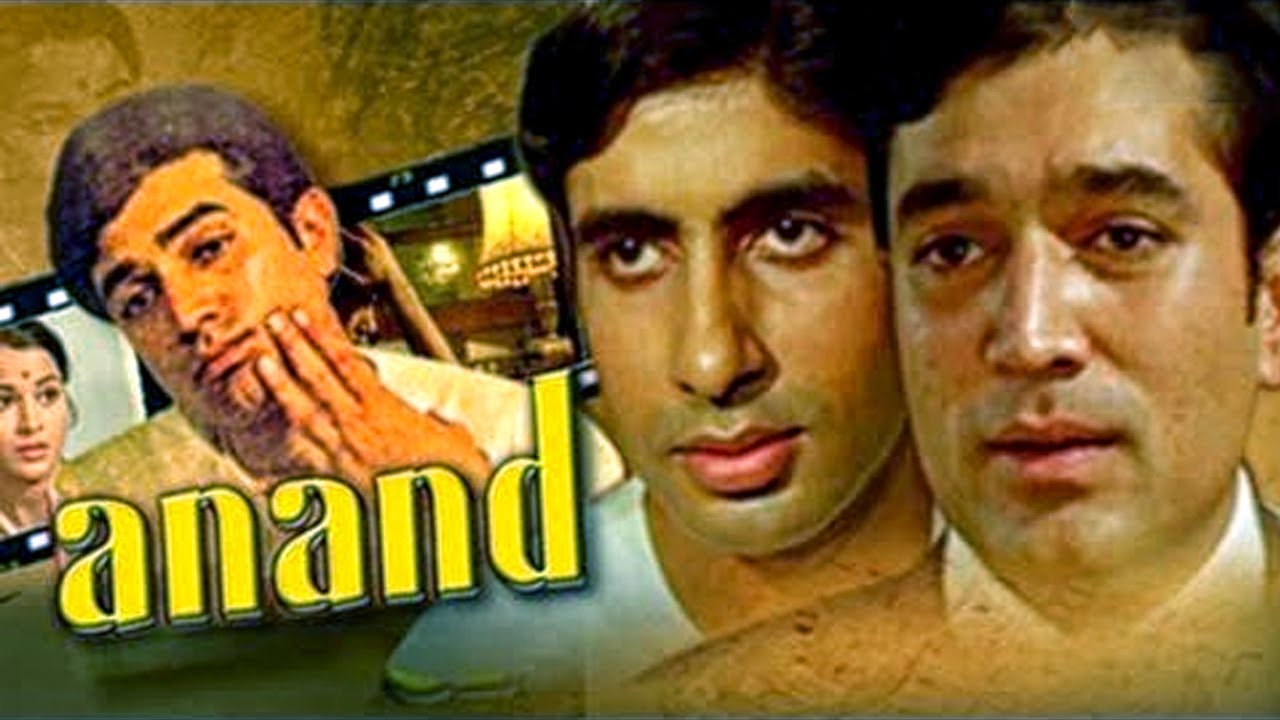Imman’s Sound Factory nestles in a quiet neighbourhood in Virugambakkam. It takes a few sharp twists and turns to arrive at his office.
Almost everyone on the road nods sagely when I ask after the address.
“Sir is upstairs only,” a security guards offers helpfully.
Three storeys above, D Imman is busy composing for his next project when I walk in. In the dimly lit recording studio (which smells divine by the way – a lovely hint of citrus and mint), he is lending finishing touches to a song, the lyrics of which flash onscreen for an instant. As Imman spots me though, the screen promptly goes blank.
He then begins to talk, amid a strange blue light that pulsates from the console.
*****
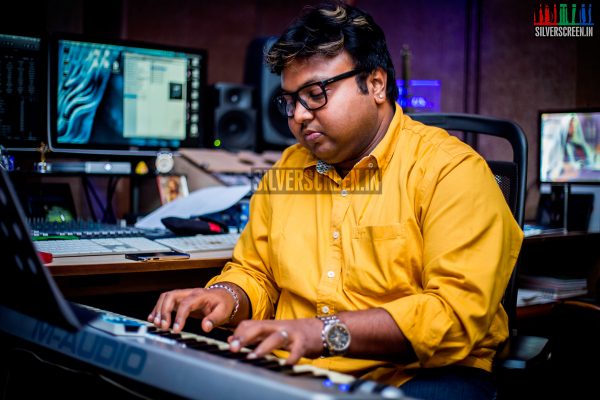
imman6
Fifteen, to be precise.
While his peers were feverishly preparing for their board exams, Imman was working with the likes of Nammavar Mahesh and Adithyan. “I was a keyboard programmer for them and did regular work in their films. Both of them, in a way, pushed me to branch out on my own. I decided to make private albums and it was that decision which changed my life.”
A copy of his album found its way to the office of Kutty Padmini & Prabhu Nepal, who were big in the television serial circuit at the time. The catchy tunes appealed to the duo and Imman found himself with a new job – composing music for the television. “My first big break was Krishnadaasi. It caught on with people and established me in the music circuit. Kolangal, Police Diary, Mandhira Vaasal and Thirumathi Selvam soon followed.”
Imman would then go on to compose the background score for over 5000 episodes and the title track for 80 serials.
Oru factory maari poitte irundhen, he says.
Very soon though, a sense of disquiet began to seep in, he recalls. “The work I did was steady, but monotonous. It wasn’t challenging.
Don’t get me wrong, I loved working on all of those projects. Every day at 7 pm, my name would flash onscreen. ‘Title isai’ by Imman.

imman5
But the unease lingered.
And, it eventually propelled him to seek other pastures. Around that time, Kutty Padmini ventured into film production, and took Imman along for the ride. It marked his debut in composing for movies. “Since I was working on almost all of their projects, Padmini ma’am had no choice but to take me along,” he chuckles. The project – Kaadhale Swasam – starring Karthik and Meena – saw a grand audio launch. “But the movie never released,” Imman adds grimly, “tough luck, of course. I had serial work to fall back on though. I was disappointed, naturally. But, life had to go on. I knew God would give me another chance.”
*****
His prayer was answered.
Producer G Venkateswaran, having listened to Imman’s work, invited him over for a meeting. “GV sir was very impressed with my songs. He said that his next film with Vijay sir would be my comeback project. Thamizhan happened. But the film didn’t do too well at the time. My work was noticed, but it was the time when O Podu from Gemini was very popular.”
Imman was unfazed, though. “I drew comfort from the fact that I could always go back to playing the keyboard for some music director. Appo avlo dhaan naan.”
Distressingly enough, the pattern continued. The projects he subsequently signed either got ‘dropped’, or ‘flopped’ miserably. “I’d compose 1-2 songs for a film, the shooting will begin, and it will get dropped. I suffered through this for around nine films.”
It had a deep psychological impact on Imman, and he grew apprehensive. “A project associated with my name would never make it to the finish line, I thought,” he gives a watery smile, “when I think about it now, it seems funny, but at that time, it was a blow to my morale.”
*****
Giri’s success gave Imman the much needed breather. “The film was a hit in B & C centres and the Dai Kaiyaa Vechukittu song in particular became a huge success. I could finally work in peace, now that the bad phase was over.”
Then followed a string of films with Arjun and Sundar C. All distinctly commercial. “They were all hits. I think that’s what I was most concerned about at the time. Every success that I was a part of made me less insecure and more confident.”
Around this time, Imman began to notice a shift in the kind of films that were being made. Realistic cinema was slowly gaining popularity among the masses. The change was a healthy one, and came at a time when action thrillers were dime a dozen. What irked Imman about this though, was that he wasn’t approached to be a part of any. “By choosing to sign on films of a certain genre, I’d become pigeonholed. Oru commercial tag vandhudhuchu. The perception was that I could only do a certain kind of music.”
*****
Mynaa changed all that. Not just my career, Prabhu sir’s too, Imman adds happily. “He was making dark films till then. Our first film together – Lee – was like that. With Mynaa, we didn’t consciously set out to break out of our respective moulds. It just happened.”
There was also the ‘special equation’ that he shared with Prabhu Solmon which helped immensely. Imman attributes it to ‘some spiritual presence’. They also shared a theera kaadhal for Ilaiyaraaja. “Both of us are very Godly. From the very beginning, we bonded like long lost brothers. We shared positive vibrations from the instant we met.”
Also, Prabhu Solomon is very clear about what he wants. “Usually, directors tell me that they want a love song. Something which will become a hit. That’s about it. But Prabhu sir explains everything. When I begin composing, I have extensive information – from the locations they plan to shoot at, to the way the characters are feeling at that particular phase. Too much information, sometimes. But, it helps.”
Suseenthiran is the same, observes Imman. “While working on Pandianaadu and Jeeva, Suseenthiran came to me with a clear plan. He told me precisely what he needed from me. So there wasn’t much I had to do except the actual composing.”
*****
Imman likens his composing to the process of creating a bespoke suit. “The director, lyricist and I sit together and compose every song. Every lyric is composed and then strung together to form a song, like a set of pearls, if you will. So, if someone doesn’t like the way a particular line sounds, we can always change it.”
He also prefers to compose on the spot. “When they get to see the process first hand, there’s no space for unnecessary doubt. It also gives me the opportunity to customize the basic tune to their preferences. Guest ah ukkara vechchu suda suda dosa sudara maadhiri.”
Paakkaadha Paakkaadha and Unna Ippo Paakkanum are examples of this, he offers. Having said that though, Imman finds it relatively easy to set tunes to lyrics as well. “The lyrics of Ovvondrai Thirudigirai and Oodha Colour Ribbon were given to me and I composed the melody for it. They went on to become hits too, so I wouldn’t say that one style of working is better than the other. Just that, I find spot composing more comfortable.”
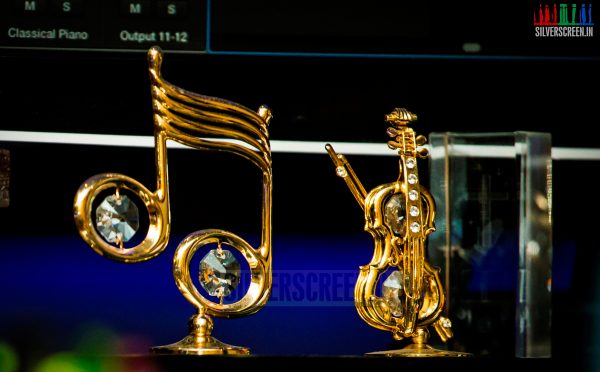
imman4
*****
Imman admits to having a soft spot for actor Vijay, whose Thamizhan and Jilla, he composed for. When scoring for Vijay’s films, though, he makes sure that all songs have a fast tempo. “He’s an acclaimed dancer. I am always conscious of this when I compose. Vijay sir’s films are predominantly commercial films with a mass audience.”
Even for situations which demand a melody – love songs for instance, Imman tries to introduce a small beat to it. “A song like Uyire Uyire from Bombay can never be a part of a mass film, how much ever we try. It just wouldn’t fit. But, if you introduce more pace, it will fit in. There’s a certain way these things should be done, a type of metre that should be followed.”
Having said that though, Imman does not have a set template for films. “My work is mostly instinctive. For a film with a rustic landscape, it doesn’t make sense to compose a song like Nee Yenna Periya Appatakkara.”
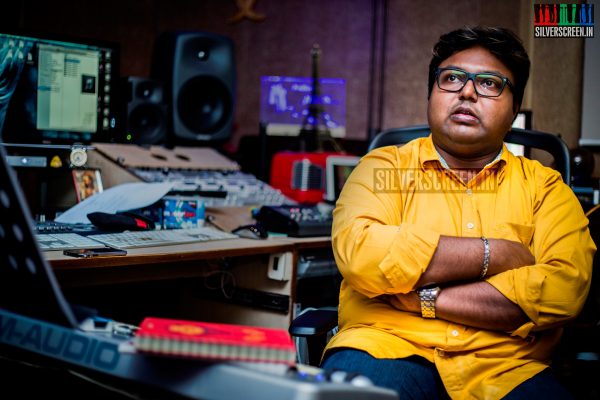
imman1
*****
Deadlines don’t have much of an impact on the way Imman works. “Very few filmmakers give the required space to work on music. This is not the case only for music composers. Everyone in the post-production team is under the same pressure. I don’t let it affect me, as my main objective is to deliver a quality product. When the film succeeds, all the pressure and stress fades away.”
The ability to adjust to the director’s sensibilities is must, according to Imman. “The first audience for a music composer is the film’s director. If the music you do doesn’t suit his/her sensibility, it will not reach their audience.”
Usually, Imman finds it easy to do this. All directors he has worked with so far have connected with him on some level. But there were a few situations in which he has found himself out of sync midway. “It’s a difficult place to be in. I’ve already committed to the project, worked on it – two, three songs maybe. And suddenly, there’s a roadblock. In cases like these, I try to bring them around to my way of thinking. If that doesn’t work, I point out instances where I’ve succumbed to pressure and came out with a product that did not do well. If the director is still not convinced, then there’s no choice but to give in. Ultimately, I’m creating songs for his story. So there’s no question of me enforcing my opinions and tastes on him.”
*****
At a time when synth music and dubstep are prevalent in almost every soundtrack out there, Imman has carved out a niche for himself by his use of live instruments. Regional Connect, he calls this. “When the audience listens to my song, they should be able to find my shade in it. When everybody else is aping the west, I went back to our roots. If it works out, good. If it doesn’t, hey, at least I tried.”
While he admits to having been influenced by the work of Michael Jackson and Hans Zimmer while growing up, Imman doesn’t find the need to replicate their work for Tamil cinema. “The way I look at it, a film with Tamil sensibilities should have a distinct Tamil sound. Just because a Shakira song is popular, I don’t see why that sound has to be incorporated into a song with Tamil lyrics.” [quote align=’right’]“In the future, when I no longer make music, and I look back on my career, I’d derive particular pleasure from the kind of work I did after Mynaa.”[/quote]
He is also a strong advocate of easy to understand lyrics – the kind that populate Prabhu Solomon’s films. “As an individual, the kind of songs I love have very normal lyrics. For example, Koduthadhellam Koduthaar and Yaarukkaaga by Kannadasan aiyya had simple lyrics that had profound meaning. Oru periya pallavi illa, but it still gained popularity.”
Imman explains that his audience have certain expectations from him, and he tries to fulfil that with every soundtrack. “In an Imman musical, people expect songs with strong melody. A couple of them will be pure melodies, and the rest – rhythm oriented. Even in the songs with heavy rhythm, I try to introduce some melody quotient, because that increases its recall factor.”
Recommended
The heavy use of melodies in his work gives him personal satisfaction. “In the future, when I no longer make music, and I look back on my career, I’d derive particular pleasure from the kind of work I did after Mynaa.”
*****
Question him about his interests outside cinema and he parts with a cheeky smile. The music composer admits to having a certain fascination for Candy Crush. “I try to reach at least two levels more before I fall asleep.”
His mobile phone does not hold as much interest as his little girls, though. “When I’m in need of a break, I speak to them. Mostly meaningless stuff. Enna pesuvomne theriyadhu, but pesitte iruppom.”
*****
The D Imman interview is a Silverscreen exclusive.
